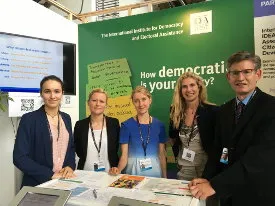Accountability in Agenda 2030 stressed by International IDEA at 2016 European Development Days

International IDEA through its Office to the European Union participated in the annual European Development Days (EDD), held in Brussels during the period of 15-16 June 2016. Aimed at generating new ideas and action in the field of sustainable development, with the theme, “Sustainable Development Goals in Action: Our World, Our Dignity, Our Future”, around 5000 participants attended the event, including world leaders, young leaders, practitioners and representatives of civil society and international organizations.
The focus of International IDEA’s stand at the EDD 2016 Village was on State of Democracy Assessments, which include the national State of Democracy Assessment Framework, the local State of Democracy Framework and the Democratic Accountability in Service Delivery Assessment Framework. Conducted in more 35 countries, these adaptable tools enable citizens, civil society organizations and authorities to assess the quality of their own democracy, with a view to define domestic agendas for policy reform. They are thus ways by which the Agenda 2030 for Sustainable Development Goals could be better implemented. Three applications of the frameworks - Mongolia, the Philippines and Zambia – were particularly featured by the International IDEA stand.
The opening ceremony of the stand was attended by the representatives of the three countries that were showcased – the Local Chair of the International IDEA Council of Member States, H.E. Mr Khishigdelger Davaadorj, Ambassador of Mongolia to the European Union, Mr Alan L. Deniega, Consul General of the Philippine Embassy and Ms Chimese K. Chibula, Deputy Ambassador of Zambia. Representatives of International IDEA Member States in Brussels, as well as local democracy support partners were also present.
In his opening address, Ambassador Davaadorj confirmed Mongolia’s commitment to democracy, and mentioned that the assessment brought about three reports, a National Plan of Action and policy reform to enhance democracy. He also commented on the initiative of Mongolia to set an additional goal to the Millennium Development Goals (MDGs), Mongolia’s MDG-9, to improve indicators of democratic governance, human rights, and zero tolerance to corruption. “Developing and collecting democratic governance indicators, carrying out surveys, engaging in focus groups and dialogues, and organizing national events and public forums have all contributed to identifying concrete challenges and possible solutions, in an effort for bring about further consolidation of democracy in Mongolia”, according to Ambassador Davaadorj.
For Andrew Bradley, Director of the Office of International IDEA to the EU, there is a definitive link between Democracy Assessment and the implementation of the Agenda 2030 Sustainable Development Goals: “Mongolia and other countries’ experiences in applying the citizen-led approach to democracy and governance assessment offer valuable lessons for establishing country-owned accountability mechanisms for inter-governmental processes, such as for the implementation of the Sustainable Development Goals.”
About 250 participants visited the stand. International IDEA staff members reached out to participants, responding to questions and promoting the Assessment Frameworks as well as other International IDEA knowledge resources and programmes. Most visitors expressed interest in one or more programmes, and in receiving more information through the mailing list and follow-up correspondence.



